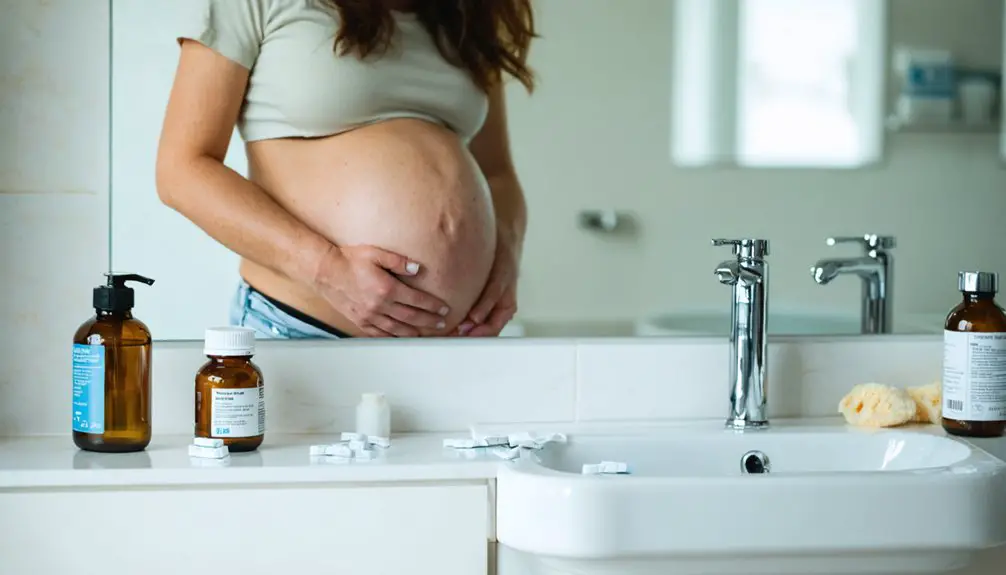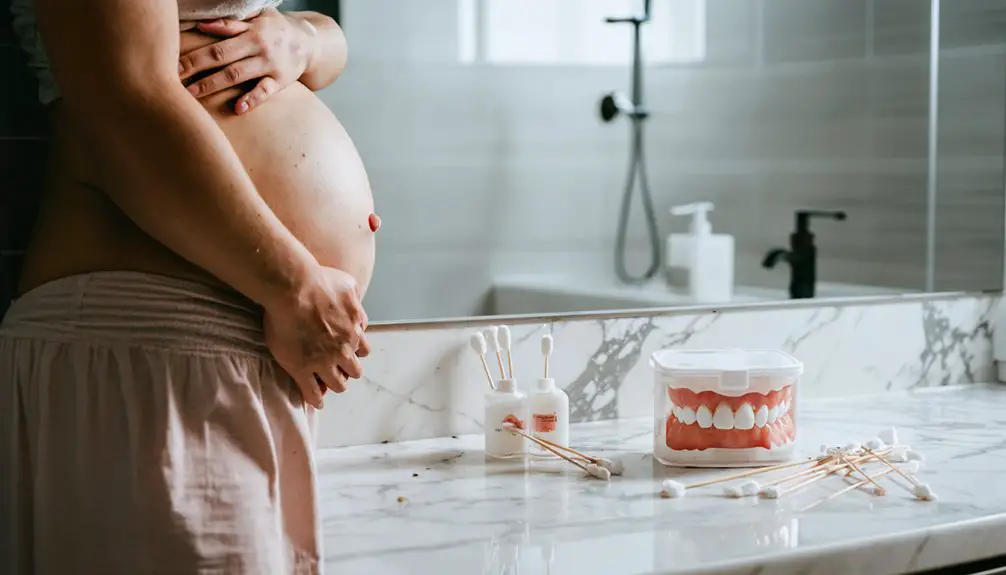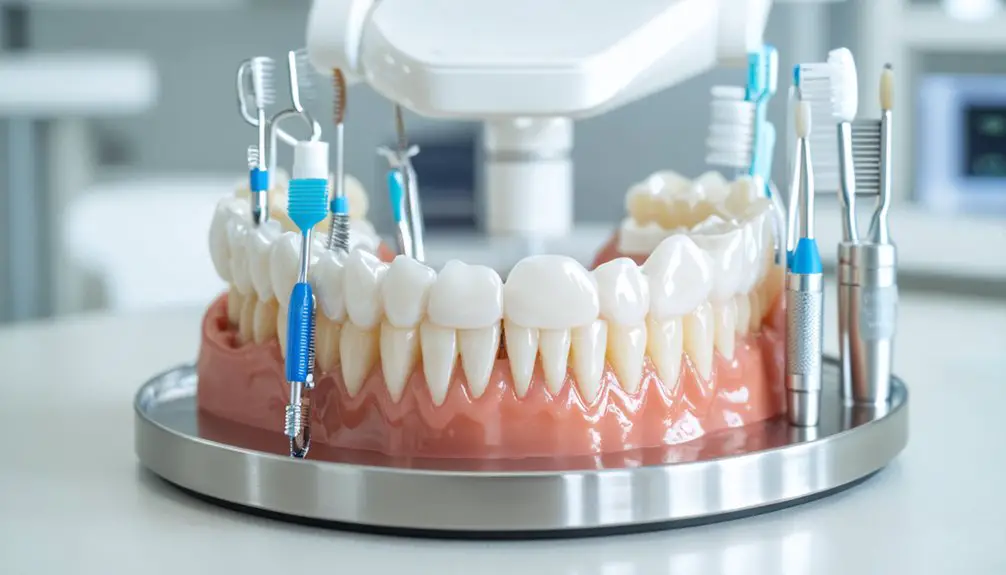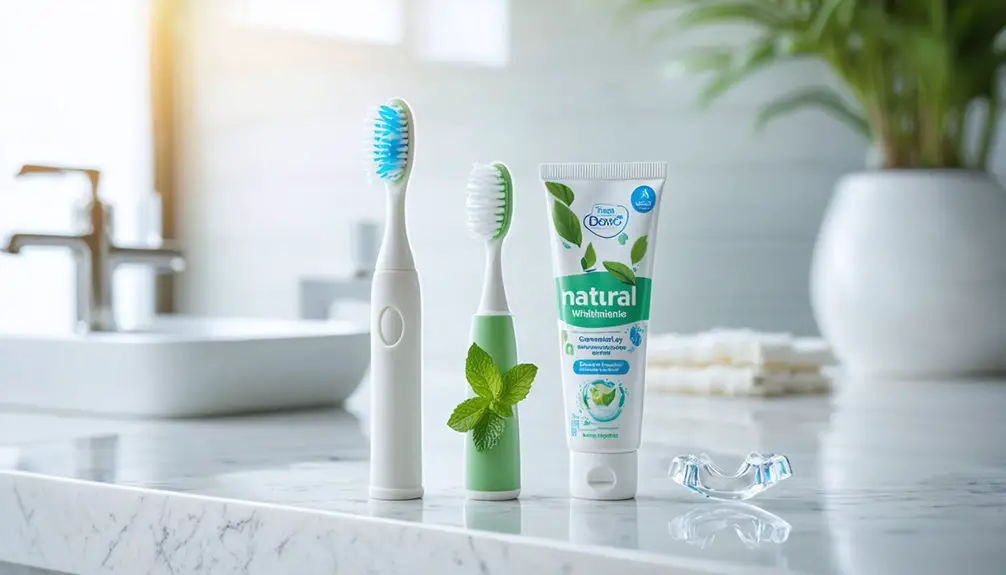You shouldn’t undergo teeth whitening during pregnancy due to significant health risks. The peroxide-based chemicals in whitening products can absorb through your inflamed pregnancy gums into your bloodstream, potentially affecting fetal development. Your increased gum sensitivity and morning sickness can also complicate treatments and reduce their effectiveness. While dental care remains vital during pregnancy, experts recommend postponing whitening until after delivery. Understanding the full scope of risks will help you make informed decisions about your dental care.
Key Takeaways
- Teeth whitening chemicals like hydrogen peroxide can be absorbed through gums into the bloodstream, potentially affecting fetal development.
- Pregnancy causes increased gum sensitivity and inflammation, making chemical absorption more likely and treatments more painful.
- Morning sickness and heightened gag reflex can complicate whitening procedures and reduce their effectiveness.
- Limited research exists on the safety of teeth whitening during pregnancy, leading healthcare providers to recommend avoiding these treatments.
- Pregnancy hormones alter oral sensitivity, often causing discomfort and burning sensations during whitening treatments.
Understanding Chemical Exposure to Mother and Baby
While teeth whitening products have become increasingly popular for achieving a brighter smile, their use during pregnancy raises significant concerns about chemical exposure.
The primary ingredients, hydrogen peroxide and carbamide peroxide, can potentially be absorbed through your gums, leading to chemical absorption into your bloodstream.
Both hydrogen peroxide and carbamide peroxide in teeth whitening products may enter your bloodstream through gum absorption.
Though the risk of swallowing these substances is low, there’s limited research on how whitening agents might affect fetal development.
Your body undergoes numerous changes during pregnancy, including increased gum sensitivity and susceptibility to gingivitis, which may enhance the absorption of whitening chemicals.
Most healthcare providers recommend avoiding teeth whitening procedures during pregnancy as a precautionary measure, given the theoretical risks and lack of conclusive safety studies. The strong odors and tastes of whitening products can trigger morning sickness in pregnant women.
If you’re pregnant, it’s essential to prioritize your baby’s safety over cosmetic dental procedures. The American Pregnancy Association specifically advises against any teeth whitening treatments during pregnancy.
How Pregnancy Affects Dental Health
During pregnancy, profound changes in hormones and physiology greatly impact your dental health, creating unique challenges that require heightened attention to oral care.
You’ll likely experience pregnancy gingivitis, affecting up to 75% of expectant mothers, with symptoms including tender, swollen gums that bleed easily. Changes in saliva flow and composition further compromise your mouth’s natural defenses, while morning sickness can erode tooth enamel through acid exposure. A concerning 64.4% report problems with their dental health during this critical period.
Maintaining consistent oral hygiene becomes vital yet challenging, as many women avoid brushing due to gum sensitivity or nausea. Preventive dental care remains safe throughout pregnancy, despite common misconceptions.
Unfortunately, only 22% of pregnant women seek dental care, despite its importance for preventing complications like periodontitis. These conditions can potentially lead to adverse pregnancy outcomes, making regular dental visits and proper oral care essential components of prenatal health.
The Impact on Sensitive Teeth and Gums
During pregnancy, your teeth and gums can become increasingly sensitive, making whitening treatments markedly more uncomfortable than usual.
The chemical agents used in teeth whitening penetrate your already-vulnerable enamel and can worsen sensitivity, particularly if you’re experiencing pregnancy-related gum inflammation.
You’ll need to be especially mindful of oral health changes during this time, as the combination of pregnancy hormones and whitening chemicals may intensify discomfort in both your teeth and gums. Using whitening products containing hydrogen peroxide bleaching can cause heightened tooth sensitivity and gum irritation during pregnancy. Consulting with a professional dentist is essential to discuss safe alternatives and potential risks during pregnancy.
Heightened Pain During Treatment
Because pregnancy hormones greatly alter oral sensitivity, teeth whitening procedures can cause intensified pain and discomfort during treatment.
You’ll experience heightened sensitivity due to pregnancy-induced changes in your gums and enamel, making whitening chemicals particularly irritating. The peroxide compounds in whitening agents can trigger sharp pain as they penetrate your already compromised enamel and interact with swollen gum tissue. The American Dental Association strongly recommends avoiding whitening treatments during pregnancy due to safety concerns.
For effective pain management, you should consider treatment alternatives until after pregnancy. Both hydrogen and carbamide peroxide could potentially harm your developing fetus.
The combination of morning sickness, altered saliva composition, and increased gum inflammation creates unpredictable pain responses during whitening procedures. Your heightened oral sensitivity means chemical exposure from whitening agents could cause burning sensations and persistent discomfort that’s difficult to control, especially since pregnancy limits pain relief options.
Managing Oral Health Changes
Pregnancy’s hormonal shifts trigger significant changes in your oral health, creating a complex web of dental challenges. With increased gingival inflammation affecting up to 75% of pregnant women, maintaining proper oral hygiene becomes vital during this sensitive period. Studies show that periodontal disease, affecting approximately 40% of pregnant women, requires particular attention during pregnancy.
Regular dental checkups help monitor these changes and prevent complications.
- Brush gently but thoroughly, as your gums are more prone to bleeding due to increased vascular permeability
- Combat reduced salivary flow by staying hydrated and using appropriate fluoride products
- Schedule professional cleanings during the second trimester when treatment is safest
- Rinse with water immediately after vomiting to protect enamel from acid erosion
- Address any tooth sensitivity or gum changes promptly with your dental provider
Bleaching Agents Worsen Sensitivity
While teeth whitening treatments promise a brighter smile, their bleaching agents can greatly amplify tooth and gum sensitivity during pregnancy.
The hydrogen peroxide and carbamide peroxide used in these treatments penetrate your enamel, reaching nerve endings and causing chemical irritation. Your pregnancy hormones already make your gums more susceptible to swelling and tenderness, and whitening chemicals can worsen this condition.
You’ll likely experience a significant sensitivity increase as the bleaching agents interact with your temporarily weakened enamel. The chemicals can trigger sharp pain when consuming hot, cold, or sweet foods.
Additionally, these agents may cause gum inflammation and mild chemical burns. If you’re dealing with pregnancy-related acid reflux, the combination with whitening treatments can further compromise your enamel’s protective barrier, leading to prolonged discomfort. In-office whitening procedures typically contain higher concentrations of peroxide, making them particularly risky during pregnancy.
Morning Sickness and Treatment Complications

If you’re experiencing morning sickness during pregnancy, teeth whitening treatments can trigger increased nausea and potentially fail due to your heightened gag reflex.
You’ll need to contemplate how the strong chemical odors and tastes from whitening agents may exacerbate your stomach sensitivity and cause treatment interruptions.
The combination of pregnancy-related nausea and whitening procedures also raises safety concerns, as involuntary gagging could lead to accidental ingestion of whitening products.
Nausea Triggers Treatment Failure
Morning sickness during pregnancy creates considerable challenges for teeth whitening treatments, often leading to incomplete results or treatment failure. The nausea effects greatly impact your treatment adherence, making it difficult to maintain consistent whitening schedules and achieve desired results.
- Strong smells and tastes from whitening agents can trigger increased nausea and vomiting.
- Vomiting episodes may wash away recently applied whitening products, reducing effectiveness.
- Frequent nausea often leads to skipped treatments or delayed dental appointments.
- Morning sickness-induced stress can impair proper oral hygiene practices.
- Treatment interruptions due to nausea result in uneven whitening or incomplete results.
Understanding these complications can help you make informed decisions about pursuing teeth whitening during pregnancy, as persistent nausea considerably reduces the likelihood of successful treatment outcomes.
Managing Sickness During Whitening
Managing teeth whitening treatments during pregnancy requires careful consideration of morning sickness complications and their impact on oral health.
If you’re experiencing frequent vomiting, you’ll need to address sickness management before pursuing any whitening procedures, as stomach acid exposure severely weakens tooth enamel.
The combination of acidic oral conditions and whitening agents creates significant whitening risks, including increased tooth sensitivity and potential treatment failure.
You’ll want to protect your teeth by waiting at least 30 minutes after vomiting before brushing, using fluoride rinses to strengthen enamel, and postponing whitening treatments until your morning sickness subsides.
If you’re considering whitening while pregnant, consult your dentist first – they can evaluate your oral health and recommend safer alternatives that won’t compromise your enamel or aggravate pregnancy-related gum sensitivity.
Gag Reflex Safety Concerns
Due to hormonal changes during pregnancy, you’re likely to experience heightened gag reflex sensitivity that can markedly impact teeth whitening procedures.
Understanding these gag reflex triggers and implementing proper sensitivity management becomes essential for your safety and comfort during treatment consideration.
Key safety concerns include:
- Increased risk of oral tissue trauma from excessive gagging
- Potential complications with morning sickness symptoms
- Higher likelihood of mucosal irritation from whitening agents
- Amplified discomfort from whitening trays or strips
- Possible chemical exposure through triggered reflexes
Your heightened gag reflex sensitivity, combined with pregnancy-related oral changes, creates significant safety risks during whitening treatments.
These factors can lead to tissue damage, chemical exposure concerns, and overall treatment intolerance.
Professional guidance strongly suggests postponing whitening procedures until after pregnancy to avoid these complications.
What Medical Experts Recommend

When it comes to teeth whitening during pregnancy, medical experts take a cautious stance due to limited research on its safety.
Most dental professionals recommend postponing any teeth whitening procedures until after delivery to avoid potential risks during this sensitive time.
During pregnancy, your gums may become more sensitive and prone to gingivitis, making whitening treatments potentially uncomfortable and less effective.
The American Dental Association hasn’t established specific guidelines for teeth whitening during pregnancy, but they emphasize the importance of consulting with your dentist before proceeding.
Your healthcare provider might suggest alternatives like professional cleaning to maintain oral health.
If you’re experiencing pregnancy concerns about your smile, remember that temporary discoloration is common and can be addressed safely after your baby arrives.
Safe Alternatives During Pregnancy
Although teeth whitening treatments with bleaching agents aren’t recommended during pregnancy, several safe alternatives can help maintain your smile’s appearance. You can focus on natural whitening methods and smart dietary choices that protect both you and your baby.
- Use ADA-approved fluoride toothpaste with mild whitening properties and peroxide-free formulations.
- Eat crunchy fruits and vegetables like apples, carrots, and celery to naturally clean teeth.
- Increase consumption of dairy products to strengthen enamel and reduce discoloration.
- Maintain rigorous oral hygiene with twice-daily brushing and daily flossing.
- Limit staining beverages like coffee, tea, and red wine while drinking more water after meals.
Remember to consult your dentist and obstetrician before starting any new dental care routine, as they can recommend pregnancy-safe products and techniques tailored to your needs.
Postpartum Whitening Options

Once your postpartum recovery is complete, you’ll have access to a full range of teeth whitening options that weren’t recommended during pregnancy.
Professional treatments offer the most significant results, using higher concentrations of peroxide compounds under dental supervision to address pregnancy-related stains effectively.
For a gentler approach, you can choose ADA-approved over-the-counter products like whitening strips or gels.
These postpartum treatments contain lower peroxide concentrations and work gradually over several weeks.
Before starting any whitening regimen, schedule a dental cleaning to maximize results and minimize sensitivity.
To guarantee whitening safety, wait until you’ve finished breastfeeding and your oral health has stabilized.
Your dentist can assess your enamel and gum health to recommend the most suitable whitening method for your postpartum needs.
Frequently Asked Questions
Can Using Whitening Strips Once During Pregnancy Cause Immediate Harm?
While there’s no evidence of immediate harm from one-time use, you should follow safety guidelines and avoid the potential risks during pregnancy since extensive research is lacking.
How Long After Giving Birth Should I Wait Before Teeth Whitening?
You’ll need to wait until you’ve completely finished breastfeeding, plus several additional months, to protect your dental health. Consider your teeth sensitivity and consult your dentist for personalized timing recommendations.
Do Natural Whitening Methods Like Oil Pulling Pose Risks During Pregnancy?
While oil pulling offers natural whitening benefits during pregnancy, you won’t face significant risks. It’s safer than chemical alternatives since you’re using food-grade oils that aren’t absorbed into your system.
Will Pregnancy-Related Tooth Discoloration Resolve Naturally After Delivery?
Yes, your tooth discoloration will likely improve naturally after delivery as pregnancy hormones normalize and dental health stabilizes. Changes in diet and renewed oral hygiene practices support this recovery process.
Can I Use Whitening Toothpaste Specifically Marketed as Pregnancy-Safe?
You can use whitening toothpaste labeled pregnancy-safe, as these products contain gentler whitening ingredients and meet dental safety standards. Still, consult your dentist to confirm it’s appropriate for your specific needs.
References
- https://patient.enlightensmiles.com/blogs/teeth-whitening/teeth-whitening-during-pregnancy
- https://www.glowdental.co.uk/some-facts-about-teeth-whitening-during-pregnancy/
- https://www.regencysquaredental.com/is-teeth-whitening-safe-for-pregnant-women/
- https://www.thebump.com/a/whiten-teeth-pregnancy
- https://www.finestdentistry.com/2023/01/12/can-you-whiten-your-teeth-while-pregnant/
- https://mothertobaby.org/baby-blog/whitening-teeth-during-pregnancy-or-breastfeeding-lets-bite-into-the-subject/
- https://kidshealth.org/en/parents/tooth-whitening-pregnancy.html
- https://news.uthscsa.edu/dental-care-during-pregnancy-is-safe-but-remains-overlooked-data-shows/
- https://pmc.ncbi.nlm.nih.gov/articles/PMC6883753/
- https://www.dovepress.com/assessment-of-oral-health-status-and-pregnancy-outcomes-among-women-in-peer-reviewed-fulltext-article-PPA



